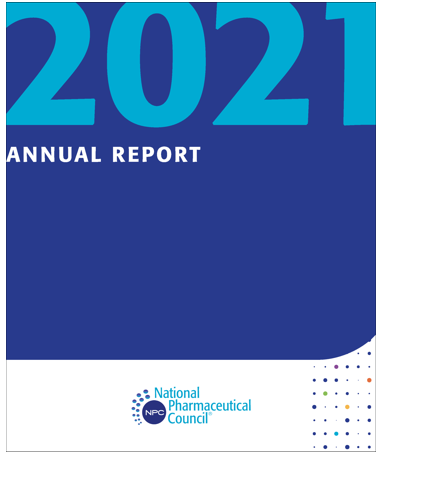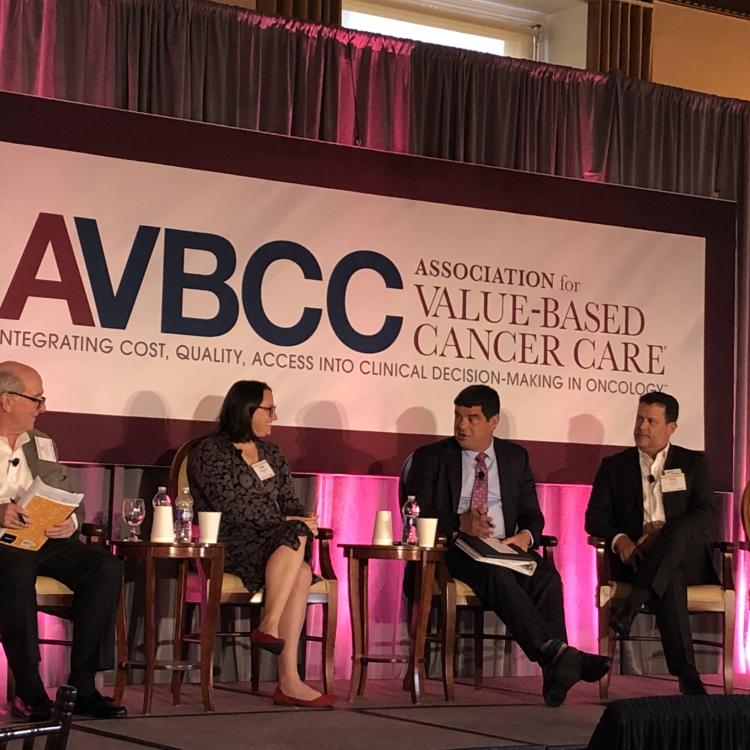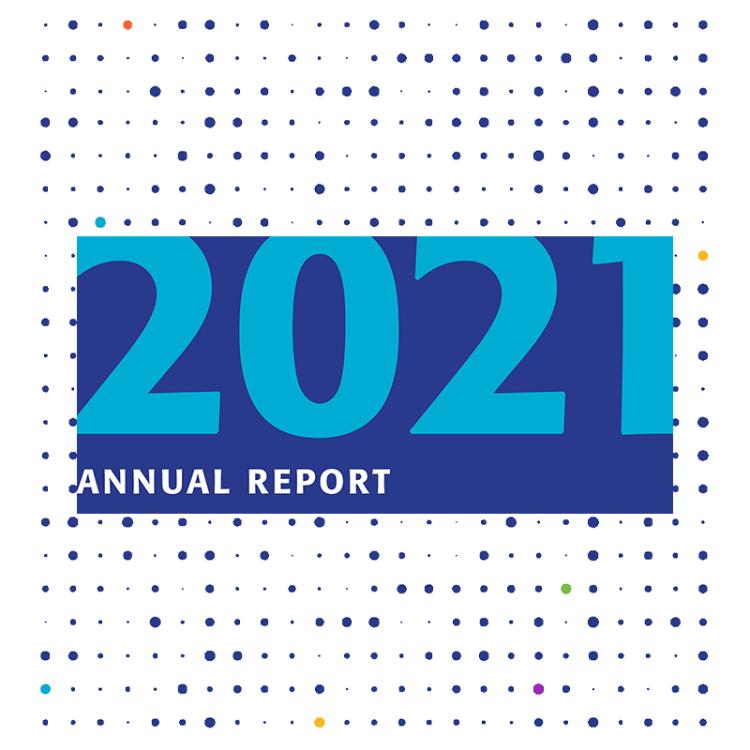 2021 was an important year in the National Pharmaceutical Council's nearly 70-year history. In the midst of a global pandemic and intense debates about rising U.S. health care spending, NPC transitioned to new leadership, welcoming John M. O'Brien, PharmD, MPH, as our new president and CEO.
2021 was an important year in the National Pharmaceutical Council's nearly 70-year history. In the midst of a global pandemic and intense debates about rising U.S. health care spending, NPC transitioned to new leadership, welcoming John M. O'Brien, PharmD, MPH, as our new president and CEO.
Under his guidance, the NPC team worked hard to explore, demonstrate, and communicate the role and value of innovative biopharmaceuticals to achieve better patient health. Our policy-relevant research is the foundation of our work and our communications-forward approach ensures that this research lands in the hands of relevant policymakers and decision-makers.
Read NPC's 2021 Annual Report and watch the Year in Review video below to learn about our efforts to foster evidence-based health policy conversations and decision-making through high-quality research and analysis on issues related to innovation and health spending, patient access, the value of medicines, and real-world evidence.
Table of Contents
Video: Year in Review
Chair's Message
2021 was one of the most important years in the history of the National Pharmaceutical Council (NPC).
We conducted searches for and selected both a new chief executive officer and chief scientific officer, as well as crafted a strategic plan for 2022-2024. I was honored to lead NPC at this critical time and to help set the organization’s course for a strong future.
As a backdrop to NPC’s internal changes, our society continued to face a once-in-a-lifetime global pandemic, while also engaging in an intense debate around health care spending in the United States. This environment made NPC’s leadership changes and strategic planning efforts even more vital.
NPC plays a unique role in the health care policy landscape, bringing much-needed insight to issues of innovation and health spending, the value of medicines, and patient access to medicines.
With the appointment of John M. O’Brien, PharmD, MPH, as president and CEO in June, NPC is well-positioned to develop rigorous research that informs ongoing policy debates. His wide-ranging experience – including as a pharmacist, a federal government official, and an insurance executive — brings different, meaningful perspectives on the challenges and opportunities for improving our health care system.
In his first six months, Dr. O’Brien led the search that found NPC’s new chief scientific officer, Sharon Phares, PhD, MPH, who brings her own diverse background in health policy research and a clear vision for NPC’s future research. I’m confident that the partnership between these two leaders will result in a bright future for NPC and the successful execution of the 2022-2024 strategic plan. Developed under the Board’s guidance, the strategic plan keeps credible research at the core of NPC’s work while seeking to greater amplify this research through a more communications-forward approach.
Scientific breakthroughs in medicine are outpacing the development of new payer models and policies in the health care system. To ensure patient access to new, life-changing treatments, it’s more important than ever that health care decision-makers are reading NPC’s research. NPC's work digs deeper into topics like the uncertainty inherent in health technology assessments (HTAs) and how employers can implement more equitable health benefit designs, helping stakeholders better understand the possible consequences of health policy decisions and actions.
I am excited to see NPC’s new strategic plan come to life under the leadership of 2022 NPC Board Chair Steven Romano, MD, executive vice president and chief scientific officer of Mallinckrodt Pharmaceuticals. Going forward, NPC’s work will continue to inform critical health policy conversations and solutions that achieve patient access and affordability while also fostering innovation.
Michael L. Ryan, PharmD, Senior Vice President, Worldwide Value, Access, Payment & Health Economics and Outcomes Research, Bristol Myers Squibb
President's Message
When I took the helm of the National Pharmaceutical Council in June 2021, I had the privilege of joining an organization with a rich history of policy-relevant research and a dedicated team of professionals working toward an important mission. I am honored by the trust that the Board of Directors has placed in me at this important time in NPC’s history.
In working with the Board this year to develop NPC’s new strategic plan for 2022-2024, we strove to preserve NPC’s tradition of conducting high-quality research and addressing challenging policy questions around innovation and spending, access for patients, and the value of medicines. We also incorporated a communications-forward approach that aims to expand our reach and impact, putting our research into the hands of health care decision-makers. NPC made solid progress in this direction in 2021, overhauling our website to make our research more easily accessible and understandable, growing our social media presence, and presenting our research at numerous events.
As the debate around U.S. health care spending intensified in 2021, NPC provided rigorous health policy research and analysis to encourage policy conversations grounded in evidence.
Among NPC’s 16 peer-reviewed studies, white papers, and articles this year, we examined the drivers of health care spending, along with the potential unintended consequences for patient health and biopharmaceutical innovation from various policy proposals intended to rein in spending, including international reference pricing, government price setting, and budget caps.
NPC research also explored the access barriers facing patients and demonstrated how building better health benefits can improve health outcomes. For example, we published on criteria for implementing step therapy protocols that account for patient needs and concerns, not just costs. Our team members also partnered with the National Alliance for Healthcare Purchaser Coalitions to create and present valuable information and research on patient-centered benefit design to employers and other stakeholders.
Of course, the ability to appropriately value medicines plays an important role in benefit design, with some insurers making coverage decisions based on value assessments. As such, NPC continues to serve as a leading voice on the need to improve value assessments through the inclusion of a broad range of evidence and stakeholder perspectives, especially patients. NPC also urges increased transparency around the uncertainty inherent in these assessments, as demonstrated by NPC-sponsored research by Tufts Medical Center.
Despite facing ongoing challenges from the COVID-19 pandemic, NPC’s staff accomplished an impressive amount of work in 2021. I am incredibly grateful to lead NPC and am excited about our bright future.
John M. O’Brien, PharmD, MPH, President and CEO, National Pharmaceutical Council
NPC in 2021
In 2021, the COVID-19 pandemic continued to serve up challenges and test our resilience as individuals and as a society. But this year, we were armed with a better way to fight against the virus: vaccines.
Over the course of the year, about 205 million people in the U.S. were fully vaccinated against COVID-19. As an organization, NPC committed to requiring COVID-19 vaccination for our employees in our office to preserve employee and public health. The rapid development of these lifesaving vaccines is a testament to the remarkable efforts of the biopharmaceutical industry in protecting the health of our country. But COVID-19 vaccines and therapeutics are just one example of how the biopharmaceutical industry improves patients’ lives.
At NPC, we worked hard this year to explore, demonstrate, and communicate the role and value of innovative biopharmaceuticals to achieve better patient health. NPC’s policy-relevant research is the foundation of our organization’s work and delves into four strategic areas: biopharmaceutical innovation and spending, patient access to treatments, the value of medicines, and real-world evidence.
Meanwhile, NPC’s communications-forward approach ensures that our research lands in the hands of relevant policymakers and decision-makers. This year NPC kicked off two coordinated campaigns to draw attention to our latest health policy research. The Building Better Benefits campaign focuses on how modernizing health insurance benefit design can improve patient access and affordability for innovative, high-value medicines. The Innovation Matters campaign highlights how biopharmaceutical innovation improves patient health and delivers tremendous value to both individuals and society broadly.
Throughout the year, NPC shared its research and activities via a broad array of communications channels including our newly updated website, E.V.I.dently® blog and e-newsletter, social media, commentaries, and personalized outreach to members, partners, and media. NPC’s work and activities were featured in more than 90 news articles.
Watch NPC's 2021 Year in Review
Innovation & Spending
With more than 500 million COVID-19 vaccine doses administered in the U.S. by the end of 2021, protecting hundreds of millions of Americans from the virus’s most devastating effects, the benefits of biopharmaceutical innovation were on full display.
Despite the clear value that biopharmaceutical innovation brought to individuals and society this year, the policy debate around how to control rising U.S. health care spending focused predominantly on drug costs. But drug prices alone are not the cause of patients’ financial burden.

NPC is committed to examining all the drivers of U.S. health care spending through rigorous research. For example, one NPC study showed the higher prevalence of chronic disease in the U.S. is a significant contributing factor to high U.S. health care spending.
Another NPC study found that spending on prescription drugs is not an anomaly but rather follows similar patterns as other health care services. Policy proposals that focus narrowly on constraining drug spending are disregarding other drivers of health spending.
NPC also looked at how health spending policy proposals could affect biopharmaceutical innovation and patient health. A research survey from NPC and Xcenda found that government involvement in drug pricing would be unlikely to increase patient affordability. In addition, NPC Vice President of Research Michael Ciarametaro, MBA, co-authored an article in Health Affairs Forefront on the trade-offs and risks associated with international reference pricing and suggested alternative policy approaches that could reduce drug costs, while maintaining incentives for innovation.
To amplify this work, NPC published commentaries in outlets including RealClearPolicy and Morning Consult explaining how government regulation of drug prices would have little effect on patient out-of-pocket costs and could lead to unintended consequences that distort pharmaceutical markets, reduce the development of new drugs, and threaten patient access to medicines.
NPC’s Innovation Matters campaign brought home the key message: We must foster biopharmaceutical innovation to ensure the continued discovery and development of new medicines that help patients live longer, healthier lives.
Access
As new medicines come to market that prevent, treat, and even cure diseases, poorly designed health insurance keeps some patients from accessing these innovative therapies. But NPC research shows building better benefits that eliminate inappropriate hurdles and reduce patients’ out-of-pocket burden can improve patient access to medicines and enhance health outcomes.
An NPC-sponsored study by the Employee Benefit Research Institute found that many large employers are expanding pre-deductible coverage for medications and services used to prevent exacerbation of common chronic conditions and would like to further broaden this coverage if allowed by law. Providing coverage before patients meet their deductible eliminates a financial barrier for patients and increases utilization of essential medicines.

NPC partnered with the National Alliance of Healthcare Purchaser Coalitions to highlight this research in a workshop at their annual forum and in an action brief for employers on equitable benefit design.
From left: NPC team members Kimberly Westrich, Amanda Green, and Virginia Sweeter attend the National Alliance Annual Forum in November.
The American Journal of Managed Care also interviewed NPC Vice President of Health Services Research Kimberly Westrich, MA, for a four-part video series on value-based benefit design.
Utilization management strategies such as step therapy can also be a barrier to timely patient care. They are burdensome for stakeholders across the health care system and can have unintended clinical consequences that may harm patients. NPC convened a multistakeholder roundtable — including payers, provider organizations, and patient groups — to discuss the appropriateness of step therapy and identify best practices. While the participants did not agree on when step therapy is appropriate, they did agree on a set of criteria to guide the implementation of step therapy to achieve clinically recommended and cost-effective patient care.
Another NPC study found that while health plans engage physicians and medical societies in developing their coverage policies, no health plan had a formal process to solicit patient input. The study authors suggested incentivizing or even requiring health plans to engage with patients.
The broader health care delivery and payment system — especially insurance benefit design — should adopt a more patient-centered mindset to achieve better outcomes, NPC President and CEO John M. O’Brien wrote in a commentary for Pharmacy Times.
NPC’s Building Better Benefits campaign outlines how patients, employers, payers, and policymakers can all play a role in improving our health benefits system.
Value
As the health care system continues to move toward value-based care, how we identify and measure the value of health care innovations is increasingly important. Incentivizing high-value care and discouraging low-value care necessitates consensus among stakeholders on the definition of value.
Value assessment is one way of estimating the value of health care interventions. However, value assessment tools often draw on evidence that is incomplete and may not adequately consider the priorities or needs of individual patients.

NPC-sponsored research by the Center for the Evaluation of Value and Risk in Health at Tufts University Medical Center revealed the impact of uncertainty and potential for bias in health technology assessments (HTAs). NPC Chief Science Officer and Executive Vice President Robert W. Dubois, MD, PhD, moderated a panel at virtual ISPOR Europe 2021 that highlighted this research.
In addition, value assessments need to do a better job of incorporating a wider range of benefits. “When ‘value’ is defined from the payer perspective, it may not capture the most meaningful priorities of patients and family caregivers,” NPC Vice President of Health Services Research Kimberly Westrich, MA, and co-authors wrote in a Perspectives piece in the Journal of Clinical Pathways. A Morning Consult commentary cited this article in advocating for the expansion of incorporating patient outcomes and patient-reported measurements when defining “value” for cancer treatments.
Because some health insurers, employers, and other stakeholders use value assessments when making coverage decisions that impact patient access to treatment, understanding the potential pitfalls of these assessments and ensuring transparency in their processes is critical. To this end, NPC continues to serve as a leading voice in this discussion by conducting research examining the inputs, methods, and standards used in value assessment and engaging with the Institute for Clinical and Economic Review (ICER) and other value assessment organizations to promote the inclusion of all perspectives on value.

NPC’s John M. O’Brien speaks during a panel at the Association for Value-Based Cancer Care’s 11th Summit & Educational Program in October.
Evidence
High-quality data, well-designed studies, and transparent, reproducible methods serve as the backbone of rigorous research. Not only does NPC strive to meet these standards in our own work, but we are dedicated to promoting these practices for all health policy research.
NPC is a partner in the Real-World Evidence Transparency Initiative, led by the International Society for Pharmacoeconomics and Outcomes Research (ISPOR), which aims to establish a culture of transparency for the analysis and reporting of real-world evidence (RWE) in health care and health research. This year, the initiative launched the Real-World Evidence Registry to provide researchers with a platform to register their study protocols before they begin work. “Using open, centralized workflows enhances collaboration and facilitates the transparency needed to elevate the trust in the study results,” the announcement stated.
The potential for biased findings in RWE studies increases substantially in the absence of a rigorous and appropriate methodological approach to study design and analysis, according to a study conducted by researchers from NPC, Brigham and Women’s Hospital, and Harvard Medical Center.

The COVID-19 pandemic also presents potential complications for RWE studies due to the dramatic shift in how and when patients sought medical care. NPC partnered with IQVIA on a study highlighting key areas that researchers should think through when designing, analyzing, and interpreting real-world studies using data collected during this pandemic.
NPC, along with other organizations, has long worked to identify best practices and standards for collecting and analyzing RWE. NPC continues to offer the CER Daily Newsfeed®, providing a summary of RWE and health policy research activities and news from around the world. By helping researchers recognize common methodological flaws, these issues can be addressed ahead of time – not just after studies are completed.
Membership and Board
NPC is a member-based nonprofit organization supported by leading biopharmaceutical companies committed to facilitating rigorous and timely research that gets to the heart of pressing health policy issues.
NPC does not engage in political advocacy. NPC conducts health policy research, which is frequently published in respected peer-reviewed journals, as well as regularly engages in multistakeholder initiatives, conferences, and other industry dialogues.
Each member company is represented on NPC’s Board of Directors and helps to shape the research agenda through participation on various Board-level committees, as well as on the Research Work Group and Strategic Communications Work Group.
In addition to our public resources, NPC develops materials exclusively for members, including special issue briefs detailing the impact of developments in the health care landscape on the biopharmaceutical industry. We also provide educational resources, practical tools, analytical papers and other information for our members.
Board of Directors
Executive Committee
Michael L. Ryan, PharmD (Chair)
Head & Senior Vice President, Worldwide Value, Access, Payment & Health Economics & Outcomes Research
Bristol Myers Squibb
Steven J. Romano, MD (Vice Chair)
Executive Vice President & Chief Scientific Officer
Mallinckrodt Pharmaceuticals
Christine G. Marsh, MBA (Treasurer)
Senior Vice President, Market Access
Boehringer Ingelheim Pharmaceuticals, Inc.
Chris Leibman, PharmD (Member-at-Large)
Senior Vice President, Head of Value & Access & Public Policy & Government Affairs
Biogen
Blasine Penkowski, MBA (Immediate Past Chair)
Chief Strategic Customer Officer,
Janssen North America
Johnson & Johnson
Board Members
Latif Akintade, MD, MBA
Senior Vice President, Patient & Health Impact
Pfizer Inc.
Christopher A. Compisi
Vice President, U.S. Market Access
AbbVie
Jim Curotto
Vice President, Integrated Account Management
Merck
Shontelle Dodson, PharmD
Executive Vice President, Medical Affairs
Astellas Pharma US, Inc.
Edward W. Feeley
Senior Vice President, Head of Market Access
Bayer HealthCare Pharmaceuticals
Patty Fritz, MS
Head, U.S. Corporate Affairs
UCB Inc.
Charles Gerrits, PharmD, MD, PhD
Senior Vice President, Global Market Access & Medical Affairs
Sarepta Therapeutics
Dean Hakanson, MD
Vice President and Head US Medical Affairs
Gilead Sciences, Inc.
Jan E. Hansen, PhD
Vice President, Evidence for Access Medical Unit
Genentech, Inc.
Denisa Hurtukova, MD
Vice President and Head of North America Medical Affairs
Teva Pharmaceuticals
Tom Koutsavlis, MD, MSc, FRCPC, MBA
Senior Vice President and Head, U.S. Business Unit Medical Affairs
Takeda Pharmaceuticals U.S.A., Inc.
Joseph W. La Barge, JD
Chief Business Officer
Spark Therapeutics, Inc.
Leigh Anne Leas
Vice President and North America Head, Public Policy
Novartis Services, Inc.
Tsveta Milanova
Senior Vice President, U.S. Commercial Operations
Alexion Pharmaceuticals, Inc.
Christian Nguyen
Vice President, Value, Evidence and Outcomes
Eli Lilly and Company
Jen Norton
Vice President, U.S. Value and Access
Amgen Inc.
Beth Rada
Vice President, Government and Public Affairs
Horizon Therapeutics
Mary Roberts, MPH
Vice President & Head, US & Global Value Access and Policy
MorphoSys
Don Sawyer, JD
Senior Vice President, US Market Access
AstraZeneca
Staff
Executive Staff
John M. O’Brien, PharmD, MPH
President & Chief Executive Officer
Robert W. Dubois, MD, PhD
Chief Science Officer & Executive Vice President
Kathryn A. Gleason
Chief Operating Officer & Senior Vice President
--------------------------------
Tanya Bailey, MS
Membership and Meetings Manager
Michael Ciarametaro, MBA
Vice President, Research
Salama Freed, PhD
NPC/Duke-Margolis Center for Health Policy
Research Postdoctoral Health Policy Fellow
Sue Grimes
Executive Assistant
Amanda Green, MPH
Research Associate
Andrea Hofelich, MBA
Vice President, Communications
Emily Ortman
Director, Communications
Brian Sils, MPP
Research Manager
Virginia S. Sweeter, CMP
Director, Alliance Development & Education
Kimberly Westrich, MA
Vice President, Health Services Research
